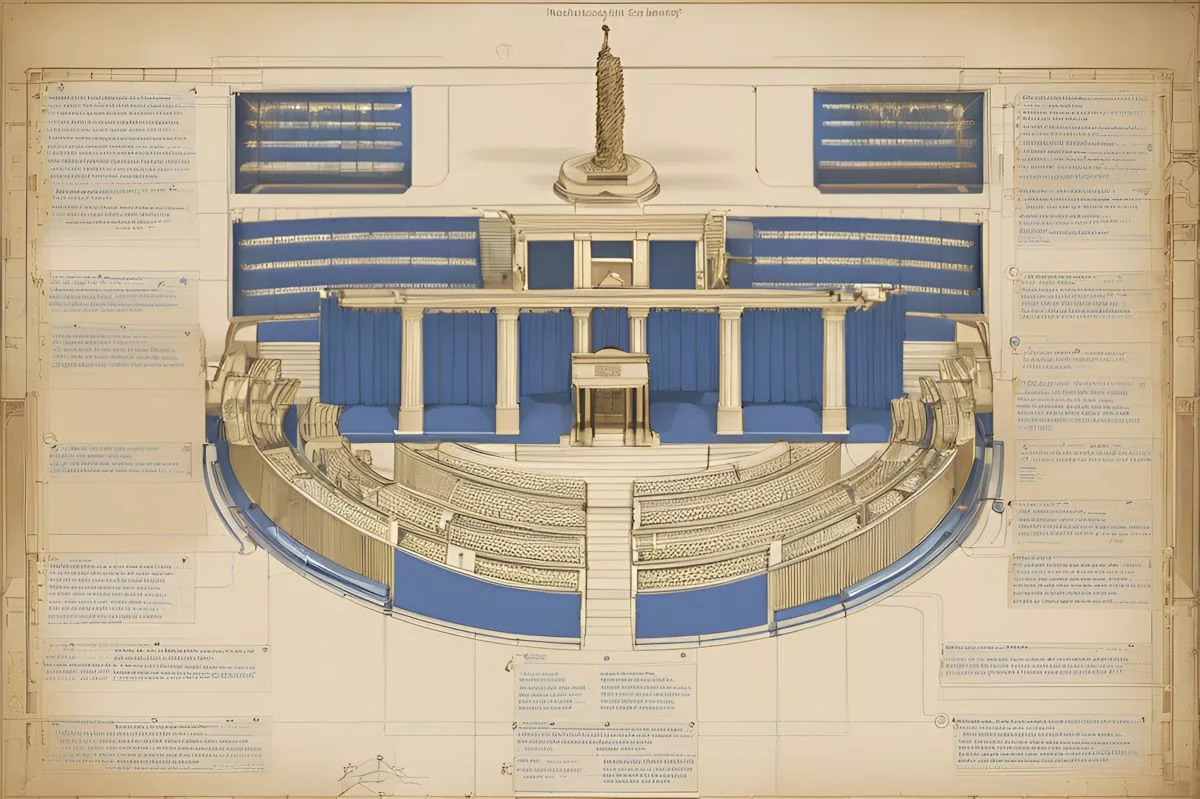South Africa’s National Assembly is establishing a new parliamentary structure for its seventh term, focusing on creating a diverse and inclusive representation. The Programme Committee, responsible for determining the House’s agenda, and the Subcommittee on Review of NA Rules, ensuring the Assembly’s rules and practices’ integrity, are key players in this endeavor. The Rules Committee is developing new rules and procedures, with a comprehensive rulebook serving as the foundation of the NA’s operation. With the Chamber holding historical and symbolic importance, the National Assembly is well-prepared to lay a robust foundation for an effective parliament.
What is the National Assembly’s Journey in Establishing the Seventh Parliament?
The National Assembly in South Africa is working towards establishing a fresh parliamentary structure for its seventh term. The creation of new committees, such as the Programme Committee and the Subcommittee on Review of NA Rules, marks the initial milestones on the path towards a new structural blueprint. The Assembly is committed to creating a more diverse and inclusive representation, laying a robust foundation for an effective parliament.
South Africa’s National Assembly (NA) is diligently working towards establishing a fresh parliamentary structure for its seventh term, right in the midst of the country’s political hub. Such a task presents both a golden opportunity and a formidable challenge. The Assembly’s assiduous efforts towards creating a more diverse and inclusive representation is a cornerstone in this endeavor.
The Rules Committee, acting as the pivot of the Assembly, convened for its first meeting towards the end of June. This underscored the commencement of the colossal task of creating the structures. The creation of new committees, such as the Programme Committee and the Subcommittee on Review of NA Rules, marked the initial milestones on the path towards a new structural blueprint.
The Programme Committee: A Key Player in The Assembly
The Programme Committee, comprised of 29 party representatives, is destined to play a crucial role in the new Assembly. The Committee is responsible for determining the House’s agenda, and its weekly meetings will significantly shape the forthcoming parliamentary term’s direction. The initial gathering of this committee was scheduled for Friday, 28 June, within the historically enriched M26 Meeting Room of the Parliament’s Marks Building.
The Subcommittee on Review of NA Rules: Ensuring Integrity
The Subcommittee on Review of NA Rules consists of nine members. Three hail from the African National Congress (ANC), with one member each originating from the Democratic Alliance (DA), uMkhonto Wesizwe Party (MKP), Economic Freedom Fighters (EFF), and Inkatha Freedom Party (IFP). The remaining three members will represent smaller parties, ensuring a balanced representation of the political landscape.
While the Subcommittee’s role is primarily technical, it is critical in upholding the Assembly’s rules and practices’ integrity. This role is indeed vital in fostering and maintaining a democratic spirit within the new Assembly.
The Rules Committee has brought forth critical determinations that will shape how the 7th Parliament operates. For instance, the portfolio committees, which are vital links in the parliamentary chain, are set to expand their compositions to accommodate 15 members per committee. This is a step up from the previous limitation of 11 members, showcasing the growing diversity of political parties within the NA.
New Rules and Procedures: Building the Base for the 7th Parliament
This new arrangement will align with the Cabinet’s structure, a detail that the Leader of Government Business must authenticate. It is this detail that will weave together the 7th Parliament’s fabric, harmoniously combining different political threads.
In tandem with this structural metamorphosis, the Rules Committee is also focusing on developing their comprehensive rulebook. Rule 193 of the Assembly mandates the Rules Committee to develop policy proposals that cater exclusively to the Assembly’s business. This encompasses procedures, proceedings, rules, orders, and practices. This rulebook will serve as the foundation of the NA’s operation, guaranteeing a smooth journey throughout the parliamentary term.
Additionally, the Committee is also contemplating the formula for appointing whips and the order of questions and motions. Terminology and definitions such as ‘majority party’, ‘leader of the opposition’, and others will also be reevaluated by the Subcommittee. Even the composition of the Rules Committee itself is up for review.
The Chamber: A Historical and Symbolic Beacon
Amid these advancements, it is essential to recognize the Chamber’s significance—the room where the House congregates to debate. Holding historical and symbolic importance, the Chamber is where the Assembly’s decisions and debates will mould the nation’s future.
As the gears of the 7th Parliament of the National Assembly start turning, it is evident that the Assembly is meticulously working towards a fruitful term. The committees and structures being set up are a testament to the Assembly’s commitment to a more democratic, representative, and inclusive parliamentary system. The journey to the seventh term may be filled with hurdles, but with its members’ dedication, the National Assembly is well-prepared to lay a robust foundation for an effective parliament.
What is the Rules Committee’s Role in Establishing the 7th Parliament?
The Rules Committee plays a pivotal role in establishing the 7th Parliament. It is responsible for developing new rules and procedures, including a comprehensive rulebook that will serve as the foundation of the NA’s operation. The Committee is also focusing on determining the formula for appointing whips, the order of questions and motions, and reevaluating terminology and definitions.
How Will the Portfolio Committees Expand Their Compositions?
The portfolio committees, which are vital links in the parliamentary chain, are set to expand their compositions to accommodate 15 members per committee. This is a step up from the previous limitation of 11 members, showcasing the growing diversity of political parties within the NA.
What is the Subcommittee on Review of NA Rules, and What is Its Role in Upholding the Assembly’s Rules?
The Subcommittee on Review of NA Rules consists of nine members tasked with upholding the Assembly’s rules and practices’ integrity. While its role is primarily technical, it is critical in fostering and maintaining a democratic spirit within the new Assembly, ensuring a balanced representation of the political landscape.
What is the Programme Committee, and What is Its Role in the New Assembly?
The Programme Committee is comprised of 29 party representatives and is responsible for determining the House’s agenda. Its weekly meetings will significantly shape the forthcoming parliamentary term’s direction, making it a crucial player in the new Assembly.
What is the Significance of the Chamber in the New Assembly?
The Chamber is where the House congregates to debate, holding historical and symbolic importance. It is where the Assembly’s decisions and debates will mould the nation’s future.
What is the National Assembly’s Commitment to Creating a More Diverse and Inclusive Representation?
The National Assembly is committed to creating a more diverse and inclusive representation, laying a robust foundation for an effective parliament. The creation of new committees such as the Programme Committee and the Subcommittee on Review of NA Rules marks the initial milestones on the path towards a new structural blueprint that is more diverse and inclusive.












